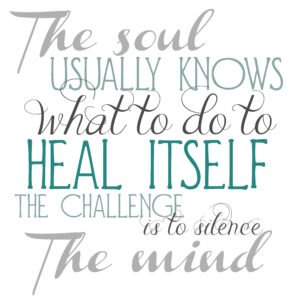 Spiritual transformation is a process of soul alignment. Soul alignment is how we honor and express our real self and live an authentic, soul-centered life.
Spiritual transformation is a process of soul alignment. Soul alignment is how we honor and express our real self and live an authentic, soul-centered life.
Even the ancient yogis understood that until we awaken to our true Self, we cannot access our power. We must distinguish “I” from others, discard all of what we’re not and deliver our real self from the bondage of codependency.
When we align our soul and our authentic Self, we are at peace, with no need for approval or to convince or change anyone. We find the resolve and courage to manifest what we want.
We suffer when we don’t live our truth and our values. When we do, we illumine our authentic Self. We ignite our power and potential, and our mind, life, and relationships attain harmony.
What is the Soul?
Everything on earth – including every species of plant and animal, and each individual person, plant, each flower, seed, and cell – is a materialization of supreme intelligence, the absolute, or the Godhead, which I refer to as the divine. Our soul is its conduit and unique manifestation. It seeks full expression like an acorn becomes an oak and a caterpillar a butterfly. Each of us is a divine incarnation. What does our soul want? It calls us to live an authentic life.
The kernel of that “I” is there at infancy, though our latent potential lies hidden and camouflaged by external influences and our codependent “false self.” Once we realize our true self, we discover freedom and our power, and our will enables greater self-expression.
Your Soul Calls for Transformation
Our discontent screams for us to change. Yet, too often, we resist the challenges that are required and instead deny our yearnings with excuses or try to change someone else. It’s the disconnect from our true Self that causes us pain.
This is simple, but not easy for those of us who due to our past conditioning and trauma have abandoned our Selves, as we were once abandoned. In order to survive, we adopted a persona, beliefs, and habits that took us further from our true nature. Our soul is calling for change. It begs us to come home — what we will never find in a relationship or work unless they support our authentic Self and allow our soul’s expression.
In recovery from codependency, we recover our real self that was once lost. How do we undertake this journey? We must spend time with ourselves, not in distraction, but by being quiet enough to feel and listen. Our awareness and perspective expand, and our perceptions sharpen. More time in meditation and contemplation infuse our body/mind with spiritual energy that allows us to perceive our soul’s guidance–whispers of wisdom from within.
We develop a sense of inner knowing and loving direction, not the harsh or doubting voice of an inner critic. We need to listen and also honor that quiet voice that leads us. With greater knowing and mindfulness of our feelings, night dreams and daydreams, and intuitions, we’re naturally drawn to what delights us and avoid what causes pain. These impulses are innate for an infant, but most of us have lost touch with our instincts and natural Self.
Living an Aligned, Soul-Centered Life
Living authentically means thinking more with our heart than our mind. However, advice to “Follow your heart” can be tricky, for our soul’s guidance may be obscured by neediness, shame, and fear. Our heart may want us to cling to an abusive relationship, but our soul never wants us to be diminished or undermined. We can easily get lost by clinging to our traumatized parts. We may not hear or trust the leadings of our soul. They may be obscured by past programming, doubts about our worth, dependency, and lack of courage to step forward, take a stand, or fear of change.
We each must find our way, learning to honor, express, and love our true Self. Soul alignment challenges us to discover who we are, what we believe, feel, need, want, and value. Indeed, every moment provides opportunities to affirm our authentic Self.
When you don’t meet your needs or act in accordance with your wants and values, welcome this awareness with curiosity rather than self-judgment. What is the source of conflict between what you need and want and how you act? Self-examination provides clarity and potentiates better choices in the future.
For example, if you say yes when you want to say no, or eat a dessert when you’re trying to lose weight, instead of attacking yourself, develop compassion for the parts of you that still struggle and are in need of self-love. To deepen self-love and compassion, listen to the Self-Love Meditation.
When we don’t believe in ourselves or that change is possible, working with someone who does can open real possibilities by removing cobwebs and blinders. A therapist or coach can hold a vision of the future you before you can see it and can support you in the changes your soul is yearning for. Mentor yourself by practicing the Soul-Alignment Meditation to begin living a soul-centered life.
Darlene Lancer © 2020


